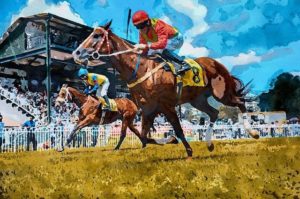Who was the first jockey since Sir Gordon Richards to ride 200 winners in a season?
Hailed by British Pathé as ‘World’s Greatest Jockey!’, Sir Gordon Richards rode 4,870 winners during his career and won the Flat Jockeys’ Championship in 26 occasions between 1925 and 1953. Remarkably, he rode over 200 winners in a season on twelve occasions and twice broke the record for the greatest number of winners in a single season.
In 1932, Richards became stable jockey to Beckhampton trainer Fred Darling and rode 259 during the season, thereby breaking the previous, long-standing record, 246, set by Fred Archer in 1885. Fifteen years later, in 1947 – the year in which Darling retired, to be succeeded at Beckhampton by Noel Murless – Richards broke his own record with 269 winners. That record would stand until 2001/02, when finally broken by Sir Anthony McCoy, who rode 289 winners that season. Reflecting on his extraordinary career, McCoy said, ‘Breaking Sir Gordon Richards’ record will always be my greatest achievement, nothing is even close.’
However, even before McCoy rode his first winner, the first jockey since Sir Gordon Richards to ride 200 winners in a season was, in fact, the late Pat Eddery. In 1990 – the year in which he won the Derby on Quest For Fame for his retainer, the late Khalid Abdullah – Eddery rode 209 winners, en route to the eighth of his eleven wins in the Flat Jockeys’ Championship.
 The simple answer is yes, he did, at the first time of asking. Fresh from becoming the youngest jockey in history to win the US Triple Crown, on Affirmed, in 1978, Cauthen made his eagerly-awaited British debut at Salisbury on April 7, 1979. His first ride on British soil, Marquee Universal, trained by Barry Hills, was a winning one and, less than a month later, he had partnered Tap On Wood, again for Hills, to a half-length victory over hot favourite Kris in the 2,000 Guineas at Newmarket.
The simple answer is yes, he did, at the first time of asking. Fresh from becoming the youngest jockey in history to win the US Triple Crown, on Affirmed, in 1978, Cauthen made his eagerly-awaited British debut at Salisbury on April 7, 1979. His first ride on British soil, Marquee Universal, trained by Barry Hills, was a winning one and, less than a month later, he had partnered Tap On Wood, again for Hills, to a half-length victory over hot favourite Kris in the 2,000 Guineas at Newmarket.